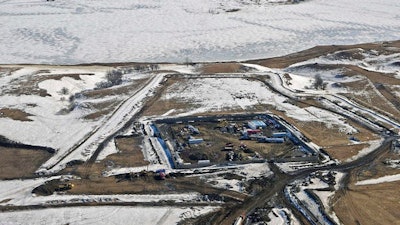
North Dakota officials appear poised to go after the U.S. government — and thus U.S. taxpayers — to recoup more than $38 million in state expenses related to protests against the Dakota Access pipeline.
A longstanding offer from project developer Energy Transfer Partners to pay up remains on the table, but it's unclear whether the state will accept it.
Republican Gov. Doug Burgum's spokesman says no decisions have been made on seeking reimbursement from the company that's worth billions. But he says the state has been talking to federal officials about reimbursement.
Dustin Gawrylow (GAV'-ur-loh) with the North Dakota Watchdog Network questions whether the financial responsibility should fall on taxpayers. He says the state should take the offered money.
Protest leaders say they think state officials already are too cozy with ETP.





















